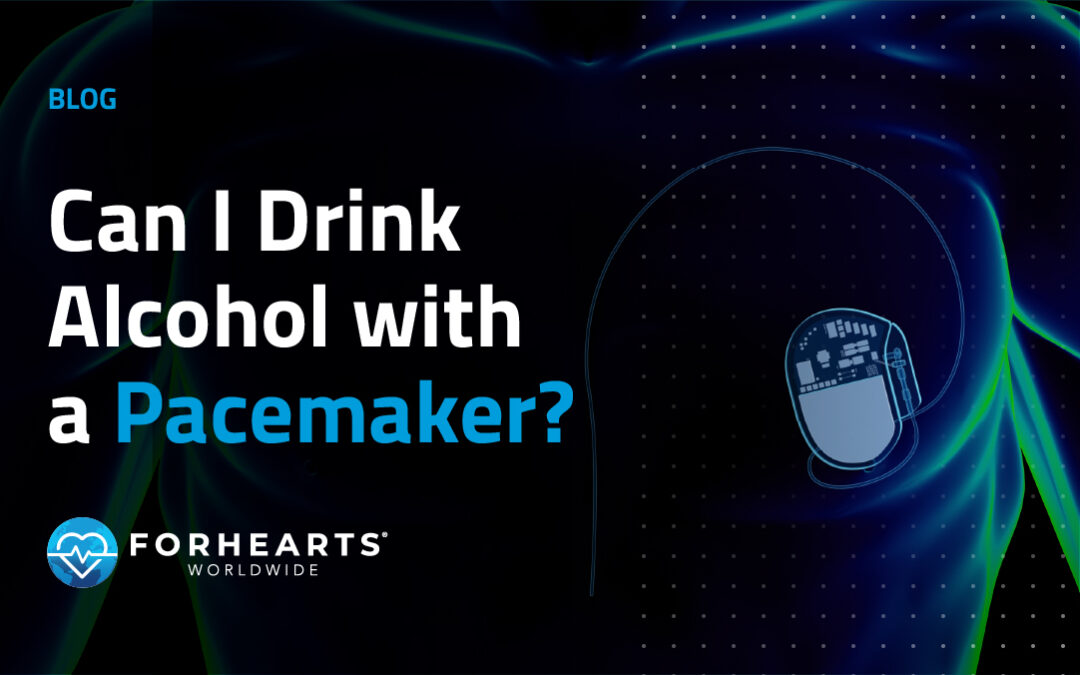While this seems like a straightforward, “yes” or “no” question, the answer is not as simple as “yes” or “no.” The effects of alcohol can be different for each person, and our relationship with alcohol (both biologically and socially) is a complicated one. So, “it depends” and “it is complicated” are part of the answer as well.
Let us take a look at the interconnection between the heart, a pacemaker, and alcohol, so you can determine the best answer to this question, with the help of your doctor.
How Does Alcohol Affect a Pacemaker?
Alcohol consumption does not affect the pacemaker device itself, but it does affect the heart. The heart is essentially an electrical system, with the sinus node, located in the right upper chamber of the heart, generating an electrical stimulus. As this electrical impulse moves through the heart, the heart contracts about 60 to 100 times a minute, with each contraction representing one heartbeat. A pacemaker works to regulate heart rhythm by connecting to this electrical system, sending electrical pulses via the device’s pulse generator, setting the rate at which the heart beats.
Alcohol can interfere with the heart’s electrical impulses and trigger atrial fibrillation, an irregular rhythm (or arrhythmia) in the upper heart chambers. This can feel like a fluttering or rapid pounding sensation in the chest. Atrial fibrillation may happen in brief episodes, such as when you have an alcoholic drink, or it may be a permanent condition.
For those who have been diagnosed with atrial fibrillation or any heart arrhythmia as a “permanent condition,” a pacemaker is often the solution, as arrhythmia is the most common reason for pacemaker implantation.
You can see how the relationship between the heart, the pacemaker, and alcohol can start to get complicated. Alcohol consumption can in fact be a cause of the very heart rhythm issues a pacemaker was designed to regulate.
Can You Safely Drink Alcohol with a Pacemaker?
Generally, anyone with a pacemaker or other implantable cardiovascular device can still drink alcohol in moderation, which means no more than two alcoholic drinks a day for a man and no more than one for a woman. However, those diagnosed with heart rhythm abnormalities, such as atrial fibrillation, may want to avoid even drinking that little, whether they have a pacemaker or not. A study conducted by researchers in Australia and published in the New England Journal of Medicine found that atrial fibrillation occurred less often in people who stopped drinking altogether.
If you do have a pacemaker and drinking even a moderate amount of alcohol causes discomfort in your chest, a feeling of your heart racing, or “inappropriate shocks” from your device, it is best to cut back or abstain from alcohol completely. Again, keep in mind what your pacemaker was designed to do and why you have it in the first place.
Besides treating arrhythmia, a pacemaker can be needed to help a weak heart to beat “in sync”. This can be due to heart transplant, an enlarged heart muscle, congestive heart failure, congenital heart defects, or a previous heart attack.
Whether or not it is “safe” to drink alcohol with a pacemaker depends on the heart issue you are being treated for, your device, and what your doctor recommends based on your health.
Why You Should Consult Your Doctor About Alcohol and Pacemakers
There is no standard recommendation on drinking alcohol for those who have heart issues or have a pacemaker. That is why it is so important to consult with your doctor or healthcare provider about consuming alcohol if you have been diagnosed with or are being treated for any heart issue, including if you have a pacemaker.
It is also important to be honest with your doctor when asked about your alcohol consumption. Your doctor needs to know your diet and lifestyle in order to effectively monitor your pacemaker’s performance and recommend changes appropriately. For example, if you do experience a sudden racing heartbeat or shock from your device after drinking alcohol, this change will show on your device monitoring and reading. Also, alcohol can interfere with certain heart medications, particularly blood thinners.
Being aware and honest about your alcohol consumption is crucial to maintaining your heart health, as is following a heart-healthy diet. This includes drinking alcohol in moderation, which remember, is just one to two drinks a day. It is the “in moderation” that is key, as overindulgence can have adverse effects on your heart.
Research from the National Institutes of Health has found that long-term heavy drinking and even “acute alcohol misuse,” like occasional binge drinking, can lead to a host of cardiovascular issues:
- Hypertension (or high blood pressure), causing the heart to work harder to pump blood throughout the body, possibly leading to stroke when there’s inadequate blood flow to the brain.
- Alcohol-associated cardiomyopathy, in which a weakened heart muscle stretches out and cannot contract to pump blood sufficiently throughout the body.
- Thrombocytopenia, slowing the production of blood platelets, which can cause internal bleeding if platelet counts drop too low.
- Atrial fibrillation, where the heart beats faster than normal, leading to heart palpitations, chest pain, or fatigue.
- Arrhythmia, where the heart’s natural “pacemaker system” is disrupted, leading to irregular heartbeat and the need for an implantable pacemaker.
The answer to the question, “Can you drink alcohol with a pacemaker?” is found in how you drink alcohol: Responsibly and in moderation. And when in doubt about how much is too much, ask your doctor. It is the best way to ensure the wellbeing of your heart and your health. This is how you safely drink alcohol with—or without—a pacemaker.



Very important for your heathy heart,this article is gives so many suggestions to do,how to reduce your alcohol, when you get pacemaker insert .I am so attractive . get very good information. Thank you.
I drink alcohol like two beers a week (or glasses of wine) and feel just fine. I have not drink in excess for as long as I can remember.
According to my research drinking in moderation causes no bad effects to people with pacemakers or stem in their heart.
If you have any concerns ask your doctor’s opinion
PR
Good advice
My mother was diagnosed with AFib three years ago. A year after she had a pacemaker inserted. Her alcohol consumption has increased to 3 or 4 drinks a day in the evening. With that she has had many episodes of AFib with her pacemaker not able to do it’s job. She is not being honest with her Doctors about her true consumption. What do you suggest? Can I legally tell her Doctors?